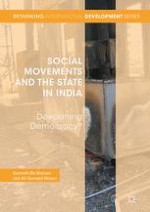2016 | OriginalPaper | Buchkapitel
5. Feminist Efforts to Democratize Democracy: Insights from Four Decades of Activism in India
verfasst von : Manisha Desai
Erschienen in: Social Movements and the State in India
Verlag: Palgrave Macmillan UK
Aktivieren Sie unsere intelligente Suche, um passende Fachinhalte oder Patente zu finden.
Wählen Sie Textabschnitte aus um mit Künstlicher Intelligenz passenden Patente zu finden. powered by
Markieren Sie Textabschnitte, um KI-gestützt weitere passende Inhalte zu finden. powered by
